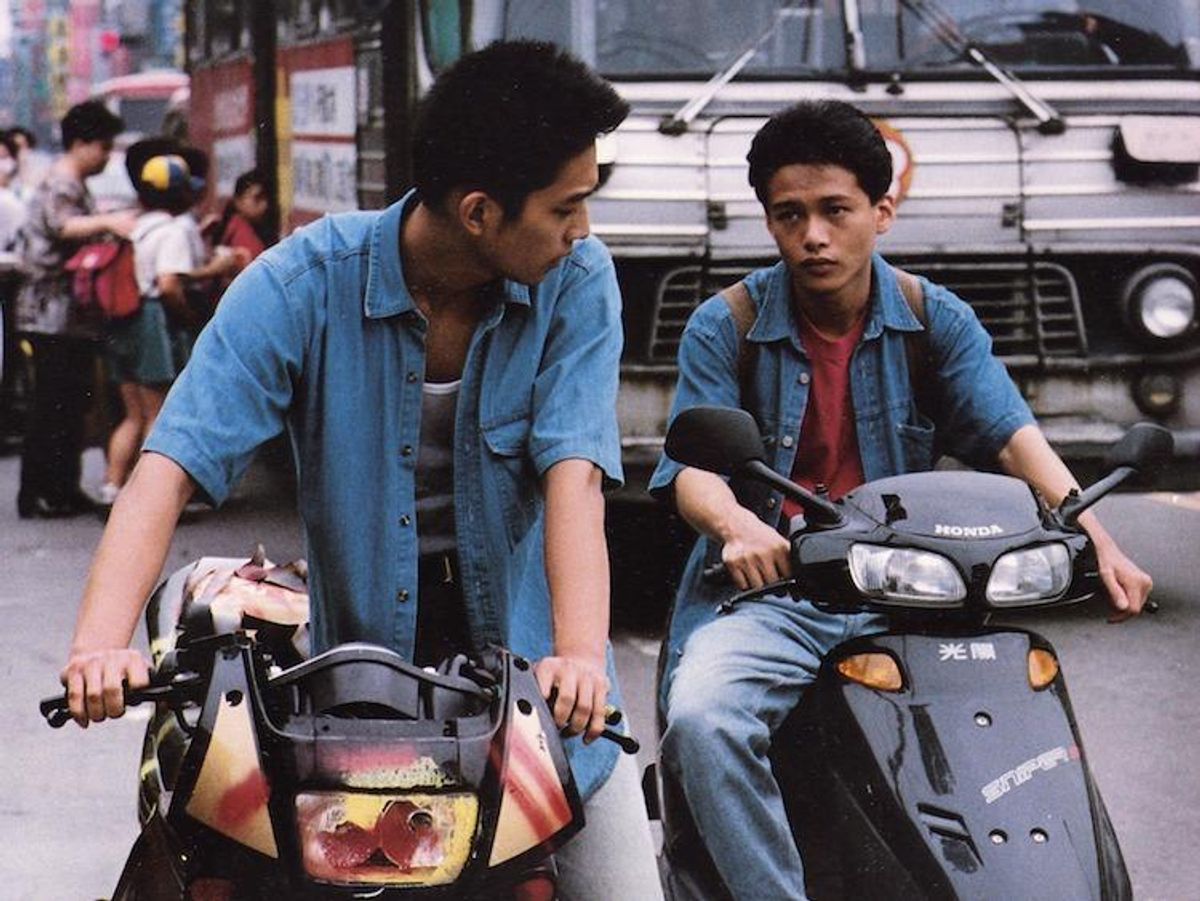
Rebels of the Neon God, the Taiwanese cult classic about gay youth, returns
April 15 2015 4:45 PM EST
May 01 2018 11:57 PM EST
By continuing to use our site, you agree to our Private Policy and Terms of Use.

Rebels of the Neon God, the Taiwanese cult classic about gay youth, returns
Before Glee made gay youth mainstream (some would argue, making it banal), filmmakers used to portray same-sex longing through profound youthful aspiration. That's the key to the films of Taiwanese director Tsai Ming-Liang whose 1992 debut feature Rebels of the Neon God -- which has just been restored and re-released for a new generation of movie lovers.
No longer simply a cult classic, Rebels of the Neon God is part of the history of gay youth consciousness in popular culture. It observes three post-adolescents, sullen student Hsiao-kang Lee (Kang-sheng Lee), stylish party girl Ah-keui Li (Chang-bin Jin) and petty thief Ah-tse (Chao-jung Chen) as they speed on motor scooters through Taipei's daily bustle or wander at night to its florescent cafes and neon-lit video game arcades. Tsai conveys their restless, dissatisfied yearning differently from Glee (or John Hughes' sprightly teen romances) but with serious sexual and spiritual undercurrents.
When Hsiao cuts his hand on a window pane and his mother complains "Do you have nothing better to do with yourself?," her question implies judgment of his masturbatory isolation. Tsai charts Hsiao's loneliness alongside the other youths. They travel in separate, nearby circles, crossing paths of sexual desire. Hsiao's quiet fascination with reckless Ah-tse (the magnetism of introvert/extrovert Alphas) is emotional geometry that leads to several violent, frustrated outbursts shown though extended parallel montages that became Tsai's trademark art-movie style.
The word "rebel" in the title was always a coded expression--before Glee popularized its own euphemism for "gay." Tsai's male-female-male trio evokes the legendary James Dean-Natalie Wood-Sal Mineo trio from Nicholas Ray's 1954 Rebel Without a Cause. A poster of Dean is prominent in one of the arcades as a sexually ambiguous figure influential through the generations. Tsai's coded use of Dean's movie idol/sex god identity suggests a pre-digital shrine. It matches the film's modern evocation of Asian folklore: Hsiao's mother associates his insolent behavior with a Buddhist deity ("The priestess says Hsiao is the reincarnation of the god Norcha").
In Asian folklore, Norcha, or Nezha, is known as "Marshal of the Central Altar," a defender of youth and protector of drivers. For Tsai, the rebel figure is another harbinger of youth's transgressive-progressive sexual search. Actor Kang-sheng Lee, whose broad forehead, pompadour and seductive frown emulate Dean, became Tsai's alter-ego in all the directors' films, particularly The River and The Wayward Cloud (films that explicitly track gay and unorthodox sexual roles).
In an age when gay social and street life center on Internet exchange, Rebels of the Neon God now looks like a period movie. It's fascinating because without Glee's nonchalance that takes sexual identity for granted, Tsai still ponders its emotional obligation and spiritual toll. His vibrant colors recall similar explorations by his sexual-aesthetic mentors (Wong Kar-Wai doing Bertolucci doing Visconti) while his sense of transient relationships anticipates Julian Hernandez.
American viewers may balk at Tsai's non-confrontational, unhurried dramatic style then be startled--puzzled--at his deep sense of feeling. Tsai's water-flooded imagery suggests mysterious, welled-up passion. Lesley Woods, the great lead-singer of Britain's sexual/political postpunk band The Au Pairs, once sang "Would you like to express your sex without stress?" Tsai asks that, too, as he depicts the profound stress of gay youth in its struggles toward openness, freedom and contentment.
Rebels of the Neon God is now screening in select cinemas. Watch the U.S. Trailer below:
REBELS OF THE NEON GOD -- Official US Trailer from J. Howell on Vimeo.
Sexy MAGA: Viral post saying Republicans 'have two daddies now' gets a rise from the right